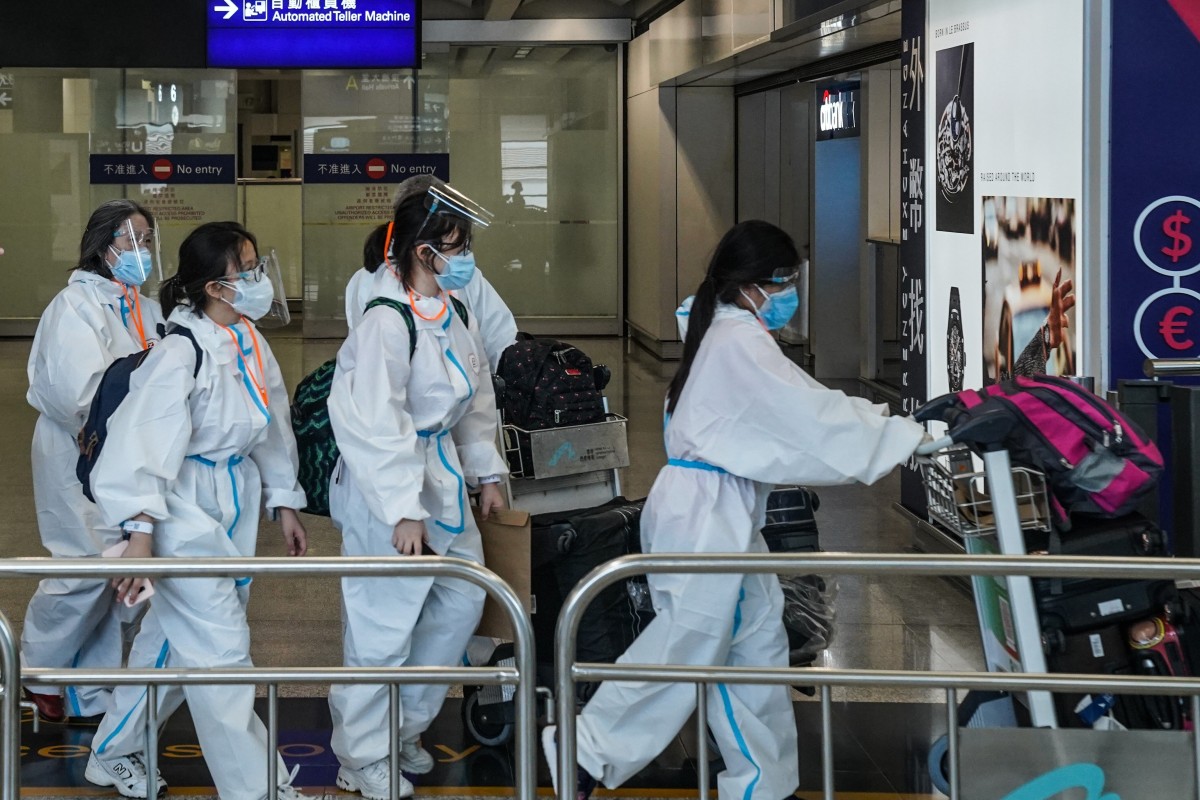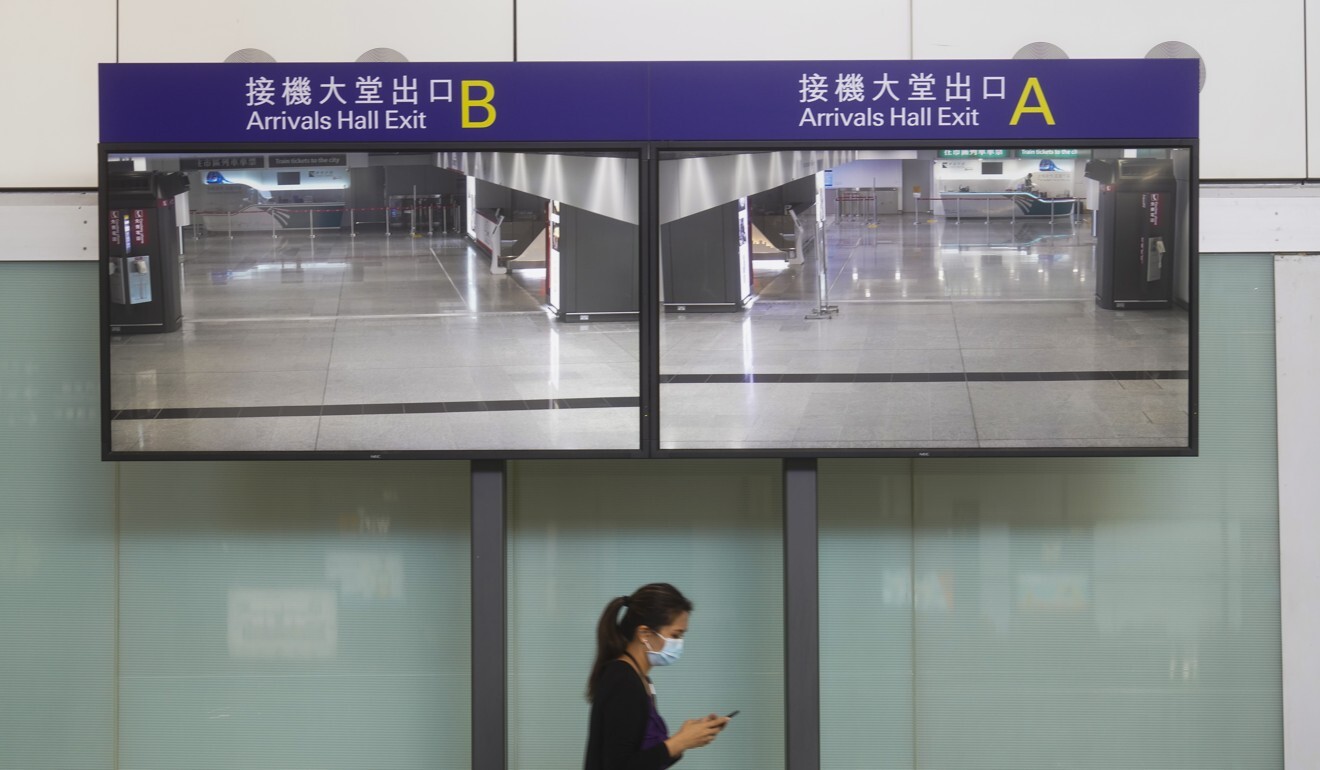
Move to take effect from October 1, with decision based on latest risk assessments
Ten other countries already on list, including Pakistan, Bangladesh and United States

Hong Kong is adding Britain to its list of high-risk countries for Covid-19, a move requiring travellers from the nation to test negative for the coronavirus before departure, and to quarantine in a hotel upon arrival to the city.
The measure takes effect from October 1 and would be in place until further notice, as Hong Kong on Thursday recorded seven new coronavirus cases. The government said the decision was made after taking into consideration the latest public health risk assessments and developments concerning the pandemic.“Britain is considered as having a bigger impact on Hong Kong, compared with France and Spain,” a source familiar with policymaking said. “When deciding on which countries to add to the list, health authorities also looked at the potential number of travellers arriving from those countries and the number of direct flights available.”
The decision, however, came as a nasty surprise for some parents whose children were attending schools in Britain, a popular study destination among Hongkongers.
Travellers arriving from Britain will now have to submit a negative coronavirus test result before boarding a plane to the city, and be quarantined for 14 days in a hotel, instead of at home. Before boarding, they will also need to submit confirmation of their hotel reservation for the duration of the quarantine.
There are already 10 countries on the list: Bangladesh, Ethiopia, India, Indonesia, Kazakhstan, Nepal, Pakistan, the Philippines, South Africa, and the United States.
Europe has experienced a rebound of coronavirus cases in recent weeks.
According to data from the World Health Organization, the daily tally of new infections in Britain has been rising since the start of the month, increasing from about 1,400 on September 1 to more than 4,900 on Wednesday.
Spain’s figures have been fluctuating but, as with France, the general trend is upwards. Both countries have each recorded more than 10,000 new cases on some days over the past week.
Globally, around 2 million new cases were recorded between September 14 and 20. The figure, a 6 per cent increase from the previous seven-day period, marked a new high of infections confirmed in a week.
Dr Leung Chi-chiu, a specialist in respiratory medicine, said Hong Kong authorities should also include Spain and France on the high-risk list to ensure the policy was applied consistently.
“The epidemic situations in France and Spain are no better than in Britain, and in fact are more severe,” Leung said. “Even though there aren’t many people flying directly in from these places, it is possible there are a considerable number of them coming in via transit.”
Of the seven new cases recorded on Thursday, four were imported, involving three domestic helpers arriving from the Philippines and an aircrew member from Britain. The three others were locally transmitted, and were related to previously known cases.
Hong Kong’s latest tally of infections stood at 5,056, with 104 related deaths.
Caroline Drewett, managing director of education consultant Belgravia Guardians, which provides services to about 300 children studying in British primary and secondary boarding schools, said the government’s move “came as a shock” to parents, many of whom were planning to bring their children back to Hong Kong during schools’ half-term break in October.
Some parents, she added, were panicking, rushing to book their children on flights arriving in Hong Kong before the new arrangements kicked in.
“Children are now flying back to Hong Kong on the 29th, 28th, 27th of September, and at this stage … some of them have booked to go back [to Britain] after half-term. Some of them are not booking, and they think they might not go back until January,” Drewett said.
Drewett noted that it would be difficult for the children to serve their two-week quarantines alone in hotels, especially given that some of her youngest clients were less than 10 years old.
However, Henry Wong Yuk-chun, general manager at The Edge Learning Centre, which serves students studying at British boarding schools and universities, said he believed the new arrangements “might not cause too much trouble” for older students, as it should not be a problem for them to acquire a negative virus test before their flights.

One mother surnamed Lin, whose 14-year-old son has been studying at a British boarding school for the past three years and is now in Year 10, said her son’s school would probably switch to online learning if Britain goes go into lockdown again.
While she planned to let her son stay in the country, she said the mandatory hotel quarantine would be parents’ biggest concern for children returning to Hong Kong.
“It’s worrying that they are staying alone. Especially for underage pupils,” Lin said. “If he or she is tested negative, should they be allowed to undergo quarantine at home instead of in a hotel?”
Meanwhile, the Hospital Authority announced it would ramp up community surveillance of Covid-19 by doubling the daily testing capacity – from some 2,000 to 4,000 – for samples collected from the city’s general outpatient clinics. Sample bottles will be available at 46 clinics, up from the current 31, and in locations across the city, including in remote places like Cheung Chau and Lamma Island.
“There is no problem with capacity. The supply has already exceeded demand. We want to make it more convenient for residents by having more places available,” the authority’s chief executive, Dr Tony Ko Pat-sing, told a press conference on Thursday.
Ko also appealed to lawmakers to approve funding in the Legislative Council’s Finance Committee meeting on Friday for a special scheme allowing Hongkongers living in Guangdong province to receive medical care and treatment at the University of Hong Kong-Shenzhen Hospital, as Covid-19 had made it difficult for many of them to come to the city for appointments.
He said the money would be given as subsidy to patients in an amount similar to what they would receive if they came to Hong Kong, and revealed that an electronic platform had been set up for patients to request and get their medical records from the city.
Responding to questions at the same press conference, Henry Fan Hung-ling, the authority’s chairman, said the government had obtained detailed legal advice on how to deal with the thousands of public hospital workers who went on strike in January to protest against the authorities’ reluctance to close the mainland border to stop the spread of the coronavirus.
Fan said letters would be sent to the strikers soon to inquire about the reasons for their absence, and officials would follow up later based on their reply. But Fan hinted dismissal would only be a last resort.
“Firing an employee is a very extreme measure; it cannot be used unless there are very serious circumstances,” he said.
Source – south china morning post


Comment